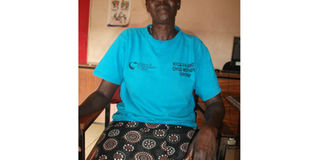Nursing a wound that has refused to heal for 13 years

Ms Alice Adong has had a wound for 13 years, which festered due to lack of proper operation while still in captivity. Photo by Cissy Makumbi.
What you need to know:
Alice Adong was abducted from her home in Odek Sub- county in Gulu District when she was 22 years old. She sustained a wound in captivity, which causes her problems to this day.
Pus still comes out of the wound which was ill operated while she was in captivity for 14 years.
Alice Adong, 52, was injured when a bomb exploded while the Lord’s Resistance Army and the government soldiers were fighting in Aruu area in southern Sudan in 1999.
Some particles entered her lower abdomen and due to lack of proper medical care, the wound has never healed. She says she was operated on by the rebels themselves and after developing complications, she could not do the servant work that she was meant to do.
The wound releases not only pus but blood as well, which worries Adong.
“I’m in pain, have tried hospitals around but they just give me antibiotics which have not done much. I feel I need better operation. At times, I feel like having no clothes on me and the left leg pains as well. I feel uncomfortable when I’m in meetings which I take some time to prepare for. There is always need to shower because of the pus that comes out every minute,” she says.
Adong, who is a mother of three, is the only breadwinner but because of the pain she goes through, she cannot do heavy work. She can only do some cleaning for people and this earns her very little. She fears that this will affect the education of her children.
The medical director at Gulu Regional Referral Hospital, Anthony Onyach, noted that Adong’s situation needs further investigation so that another operation is done.
“There could be some foreign elements that have refused the wound to heal,” he noted, adding that she should seek proper medical care before the wound becomes cancerous.
The doctors at the hospital cannot properly ascertain Adong’s problem because she is not willing to get proper treatment if she cannot afford it. So for now, she depends on simple antibiotics which she gets from the hospital.
In 2009, the government registered civilians who were physically injured in the two-decade insurgency to get support in terms of treatment, but nothing has since materialised.
At least 6,000 people were registered in the exercise, many of whom still have splinters in their bodies.
Prevailing problem
In 2001, African Psycare Research Organisation and the Department Orthopaedics, Makerere University, carried out joint treatment in the former camps and in their report revealed that only 24 per cent of the women had accessed a qualified health worker for their problems. Their sexual function were adversely affected, 22 per cent had unstable or broken marriages and 32 per cent were not able to work.
Many patients presented with untreated or poorly treated fractures, some closed, while others were open or compound fractures that were often painful, with pus from secondary infection and leading to loss of function of the affected part of the body.




